Employee Reprimand Letter
[Your Name]
[Your Title/Position]
[Company Name]
[Company Address]
[City, State, Zip Code]
[Date]
[Employee's Name]
[Employee's Job Title]
[Department/Division]
[Company Address]
[City, State, Zip Code]
Dear [Employee's Name],
RE: Formal Employee Reprimand
I am writing this letter to address a serious matter concerning your conduct and performance at [Company Name]. As an employer, it is essential for us to maintain a professional and productive work environment for all employees. Unfortunately, your recent actions have caused significant concerns, leading to this formal reprimand.
The issues that need to be addressed are as follows:
1. [Specify the first issue]: Provide a detailed description of the problem, including any specific incidents, dates, and times. Be objective and specific in your observations.
2. [Specify the second issue, if applicable]: If there are multiple issues, provide the same level of detail as above.
3. [Specify the third issue, if applicable]: Continue in the same manner if there are further concerns.
[If applicable, mention any previous discussions about the same issues or prior warnings that were given.]
It is important to emphasize that your behavior and performance are not in line with the standards we expect from our employees. As a valued member of our organization, we believe you are capable of improvement and meeting the necessary requirements to excel in your role.
We strongly urge you to take this reprimand seriously and make immediate efforts to rectify the situation. In order to improve your performance and conduct, we recommend the following steps:
1. Self-Reflection: Take the time to reflect on the issues raised in this letter and identify areas where you can make positive changes.
2. Training and Development: Consider attending relevant training programs or workshops to enhance your skills and knowledge.
3. Communication: Engage in open and honest communication with your immediate supervisor or manager to seek guidance and address any challenges you may be facing.
4. Goal Setting: Set clear and achievable performance goals, and regularly assess your progress toward meeting them.
5. Accountability: Take responsibility for your actions and demonstrate a commitment to improving your performance.
Please be aware that failure to make the necessary improvements within the specified timeframe may result in further disciplinary actions, up to and including termination of employment.
We genuinely hope that you will take this reprimand as an opportunity to grow and develop both personally and professionally. We believe in your potential and want to see you succeed within our company.
If you have any questions or require additional support during this process, do not hesitate to reach out to your supervisor or the Human Resources department.
We look forward to seeing positive changes in your conduct and performance.
Sincerely,
[Your Name]
[Your Title/Position]
[Company Name]
Formal Employee Reprimand Letter for Attendance
Subject: Written Reprimand for Attendance Issues
Dear [Employee Name],
This letter serves as a formal reprimand regarding your recent attendance record. It has been noted that you have been late on multiple occasions and have exceeded the allowed number of absences according to company policy.
Your consistent attendance is essential for team productivity and workplace efficiency. We expect immediate improvement, and further violations may result in additional disciplinary action.
Please consider this as an opportunity to correct your behavior and adhere to the company's attendance standards.
Sincerely,
[Supervisor Name]
[Position]
[Company Name]
Professional Reprimand Letter for Poor Performance
Subject: Performance Improvement Required
Dear [Employee Name],
It has come to our attention that your recent work performance has not met the expected standards. Specific concerns include missed deadlines, incomplete reports, and a lack of initiative in assigned tasks.
We are issuing this formal reprimand as a reminder that improvement is necessary. You are required to meet with your supervisor within the next week to discuss a performance improvement plan.
Failure to demonstrate improvement may result in further disciplinary action, including suspension or termination.
Sincerely,
[Manager Name]
[Department]
[Company Name]
Informal / Casual Employee Reprimand Message
Subject: Concern Regarding Workplace Behavior
Hi [Employee Name],
I wanted to bring up some concerns regarding recent behavior and adherence to company guidelines. While this is not formal disciplinary action yet, it is important that you address these issues promptly.
Please take this message seriously and work on improving your conduct. Let's discuss a plan to get back on track.
Thanks,
[Supervisor Name]
Serious Reprimand Letter for Policy Violation
Subject: Formal Reprimand for Violation of Company Policy
Dear [Employee Name],
This letter is to formally reprimand you for violating company policy on [specific violation, e.g., misuse of company resources]. Such actions are unacceptable and undermine workplace standards and trust.
We expect immediate corrective action and strict adherence to all company policies moving forward. Any recurrence will result in more severe disciplinary measures, up to and including termination.
Please acknowledge receipt of this letter and provide a written response outlining your plan to correct this behavior.
Sincerely,
[HR Manager Name]
[Company Name]
Heartfelt / Coaching-Style Reprimand Letter
Subject: Feedback and Required Improvement
Dear [Employee Name],
I want to address some concerns regarding your recent work habits. While you have demonstrated potential and dedication, certain behaviors such as [specific issue] need immediate attention.
This letter serves as constructive feedback and a reminder of expectations. We believe in your ability to improve and are here to support your development.
Please schedule a meeting with your manager to create a clear improvement plan.
Best regards,
[Supervisor Name]
Quick Warning Letter for Minor Misconduct
Subject: Warning Regarding Conduct
Dear [Employee Name],
This is a formal warning concerning recent minor misconduct observed in the workplace. It is crucial that such behavior is corrected immediately.
Continued incidents may lead to stronger disciplinary actions.
Sincerely,
[Manager Name]
Provisional / First-Time Reprimand Letter
Subject: First-Time Written Reprimand
Dear [Employee Name],
This letter serves as your first formal reprimand concerning [specific issue]. While this is not the final disciplinary step, it is important that you correct the behavior immediately.
Please treat this as an opportunity to align with company expectations and avoid further action.
Sincerely,
[HR Representative Name]
[Company Name]
What is an Employee Reprimand Letter and Why it is Important
- An Employee Reprimand Letter is a formal written notice issued to an employee for misconduct, poor performance, or violation of company policy.
- The purpose is to document the issue, communicate expectations clearly, and create an official record for HR and management.
- It helps protect the organization legally while providing the employee an opportunity to correct behavior.
Who Should Issue an Employee Reprimand Letter
- Direct supervisors or managers responsible for the employee.
- Human Resources (HR) representatives for policy-related violations.
- Department heads or higher management for serious misconduct.
- In certain cases, company executives for repeated or severe infractions.
Whom Should the Reprimand Letter be Addressed To
- The employee whose behavior, performance, or conduct is being addressed.
- HR may also be copied for documentation purposes.
- For legal or compliance matters, higher management may receive a copy.
When Should an Employee Reprimand Letter Be Issued
- Following documented instances of poor performance or misconduct.
- After verbal warnings have been given but no improvement is observed.
- Upon violation of company policies, attendance rules, or ethical standards.
- During formal disciplinary proceedings requiring written documentation.
How to Write and Send a Reprimand Letter
- Gather all facts, evidence, and dates of incidents.
- Use a professional and neutral tone; avoid emotional language.
- Clearly describe the behavior or performance issue.
- Explain company policy or expectations.
- State required corrective actions and consequences of non-compliance.
- Send as a printed letter for formal documentation or via official email if permitted.
- Ensure acknowledgment of receipt from the employee.
Formatting Guidelines for Employee Reprimand Letters
- Length: 1–2 pages, concise yet detailed.
- Tone: Professional, formal, and direct.
- Include: Subject, greeting, body explaining the issue, closing, signature.
- Wording: Clear, factual, and non-accusatory.
- Mode: Printed for HR records; email can be used for minor or provisional notices.
- Etiquette: Avoid personal attacks; focus on behavior or performance, not personality.
Requirements and Prerequisites Before Issuing
- Verify company policies related to the issue.
- Document prior incidents, verbal warnings, and related evidence.
- Review employment contract and legal implications.
- Ensure a clear improvement plan and timeline can be communicated.
- Obtain necessary approvals from HR or management if required.
Tricks and Tips for Effective Reprimand Letters
- Stick to facts and avoid subjective opinions.
- Use clear examples and dates to support the claims.
- Keep the language professional but firm.
- Include a call to action or steps for improvement.
- Maintain a copy in employee records for future reference.
Common Mistakes to Avoid
- Using overly harsh or emotional language.
- Failing to provide specific examples of misconduct or poor performance.
- Neglecting to outline consequences for continued violations.
- Sending without HR or managerial review.
- Ignoring company policies or labor laws.
Elements and Structure of a Reprimand Letter
- Subject Line: Clearly states the purpose of the letter.
- Greeting: Directly address the employee.
- Introduction: State the purpose of the letter and context.
- Body: Detailed explanation of the misconduct or performance issues.
- Expectations: Outline required actions and timelines for improvement.
- Consequences: Explain potential outcomes if behavior does not improve.
- Closing: Professional sign-off.
- Signature: Supervisor or HR representative.
- Attachments (Optional): Supporting documentation or records.
After Sending the Reprimand Letter: Follow-Up Actions
- Ensure the employee acknowledges receipt of the letter.
- Schedule follow-up meetings to review improvements.
- Document all interactions and improvements for HR records.
- Monitor behavior or performance changes and provide additional guidance if necessary.
- Escalate disciplinary action if the employee fails to meet expectations.
Pros and Cons of Employee Reprimand Letters
Pros:
- Provides a clear, official record of disciplinary action.
- Encourages corrective behavior and accountability.
- Protects the company legally in case of disputes. Cons:
- May affect employee morale if not handled sensitively.
- Could strain employee-manager relationships.
- Overuse may create a culture of fear rather than improvement.
FAQ About Employee Reprimand Letters
Q: Can a reprimand letter lead to termination?
A: Yes, repeated or severe violations documented via reprimand can lead to termination.
Q: Should a reprimand letter be signed by HR?
A: Ideally, HR or management should review and approve the letter.
Q: Can it be issued via email?
A: Minor or provisional reprimands may use email; formal letters are usually printed.
Q: How soon after an incident should a reprimand be issued?
A: Ideally within a few days, once facts are verified.
Compare and Contrast With Similar Employee Communications
- Reprimand Letter vs. Verbal Warning: Written letters provide a documented record; verbal warnings are informal and less enforceable.
- Reprimand Letter vs. Termination Letter: Reprimand seeks correction; termination ends employment.
- Email vs. Printed Letter: Email is faster, suitable for minor issues; printed letters provide formal documentation for HR.

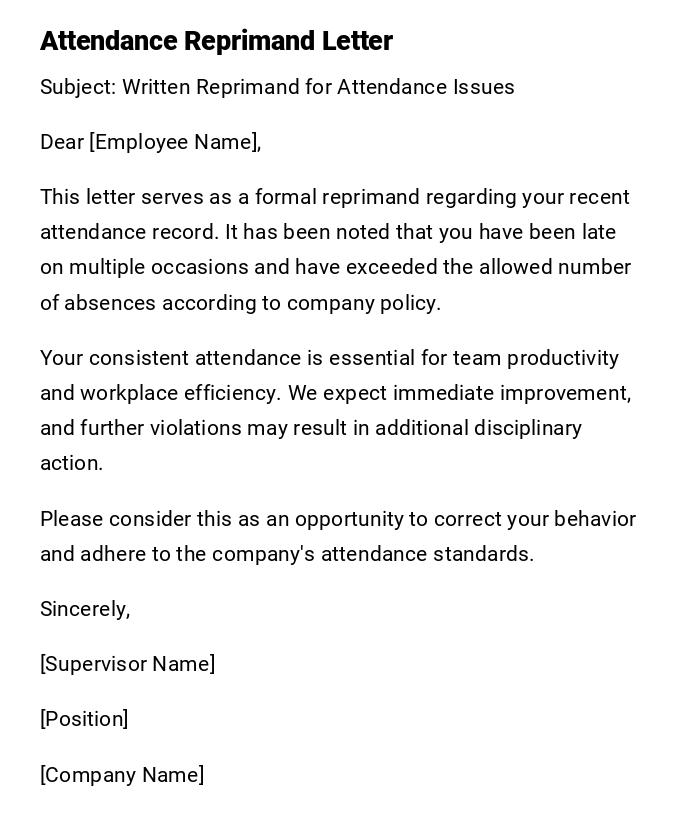
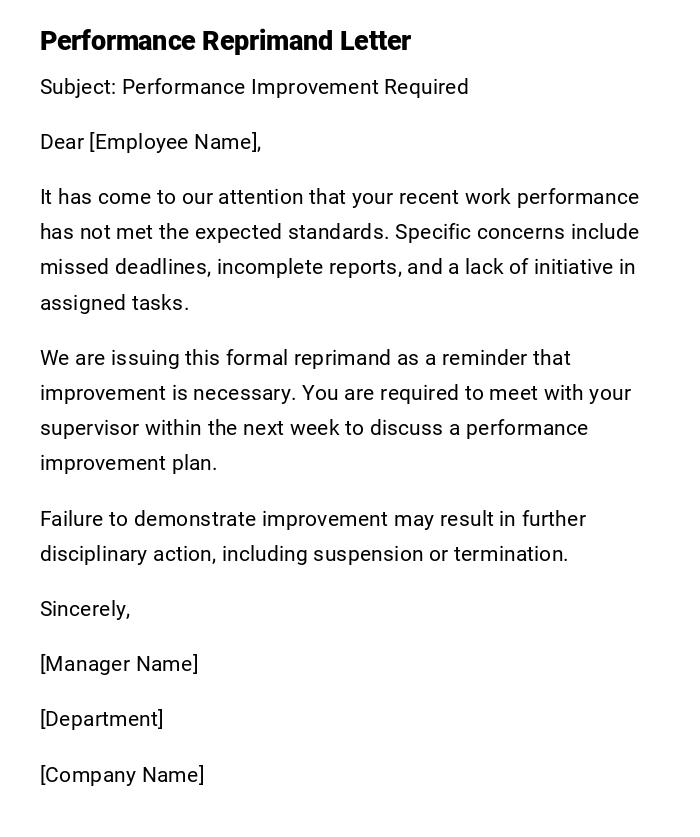
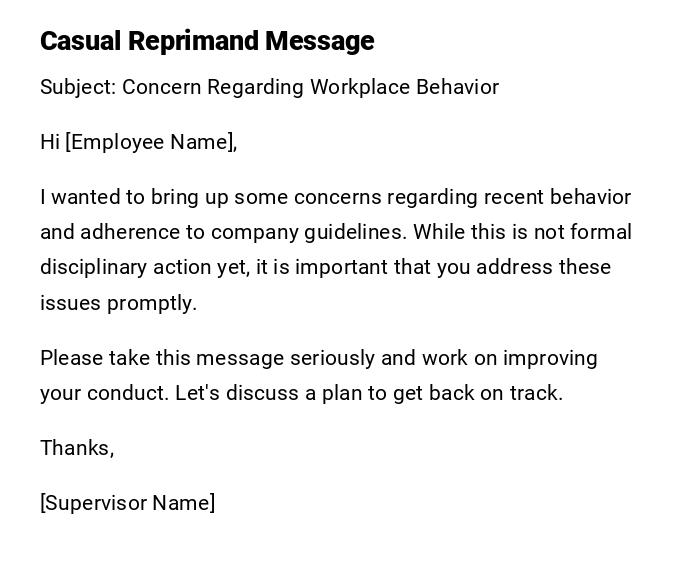
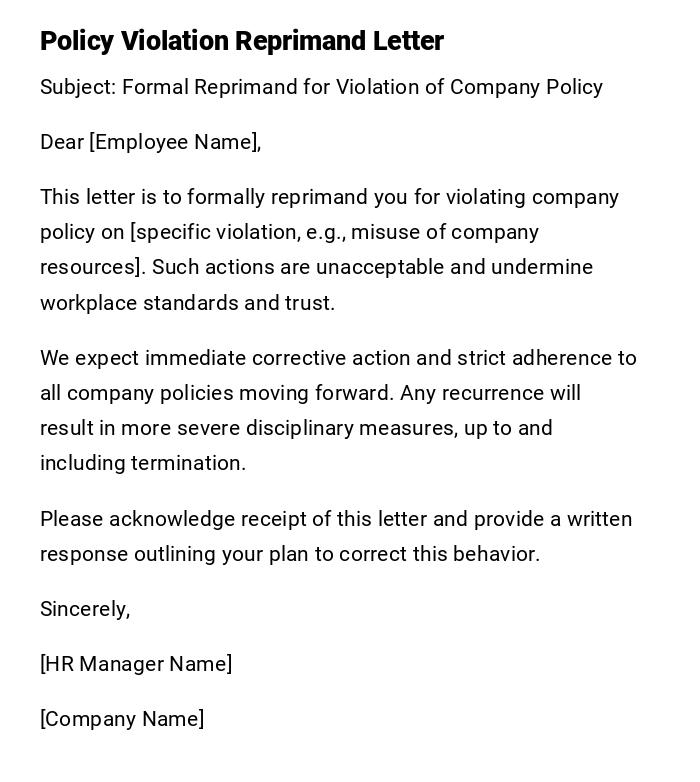
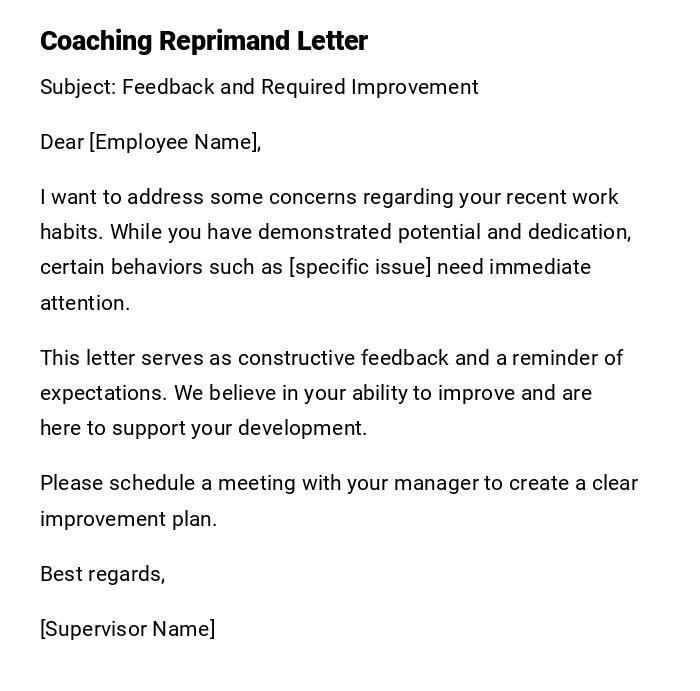
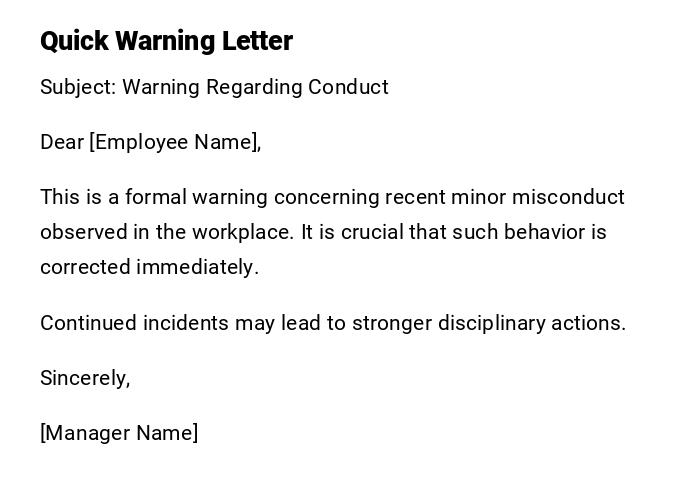
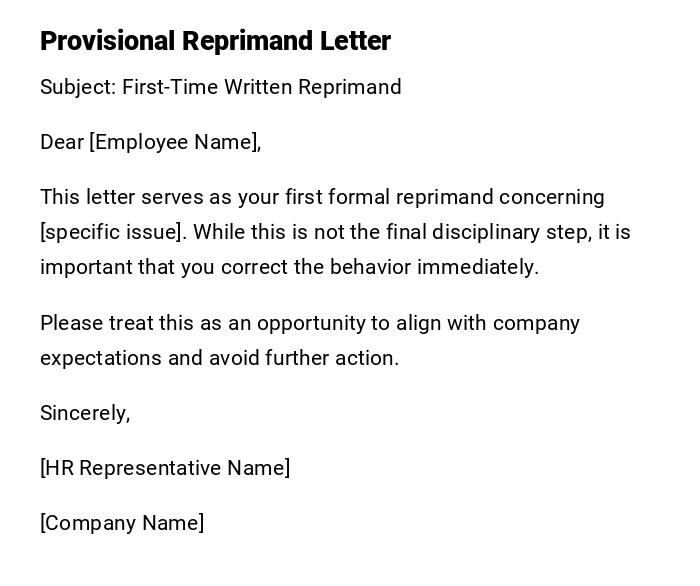

 Download Word Doc
Download Word Doc
 Download PDF
Download PDF